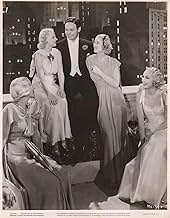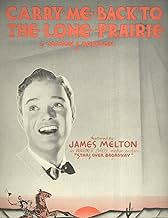Ajouter une intrigue dans votre langueAl is a down-on-his-luck promoter who is thinking of taking the final bow when he meets singing porter Jan. He sees something in Jan so he signs him to a contract. Al works odd jobs to pay f... Tout lireAl is a down-on-his-luck promoter who is thinking of taking the final bow when he meets singing porter Jan. He sees something in Jan so he signs him to a contract. Al works odd jobs to pay for Jan's singing lessons and drops the idea of Opera when he learns that it will take year... Tout lireAl is a down-on-his-luck promoter who is thinking of taking the final bow when he meets singing porter Jan. He sees something in Jan so he signs him to a contract. Al works odd jobs to pay for Jan's singing lessons and drops the idea of Opera when he learns that it will take years. He has him sing in a nightclub and from there it is up. But Jan soon starts missing les... Tout lire
- Réalisation
- Scénario
- Casting principal
- Mustached Man at Champ's Table
- (non crédité)
- Man Wanting Testimonial
- (non crédité)
- Jim Flugel
- (non crédité)
- Man in Church
- (non crédité)
- Charlie
- (non crédité)
- Listener in Italy Montage
- (non crédité)
- Man
- (non crédité)
Avis à la une
The scenario begins at New York City's Madison Square Garden where Al McGillevray (Pat O'Brien), a down-and-out agent in desperate need of cash yet refusing job charities from friends. After a gathering with newspaper reporters at Danceland where he is told he's all "washed up," Al returns to his hotel room with the intentions of ending his life. At that very moment he takes his gun from the drawer, Al encounters Jan Linzimski (James Melton), a singing porter with a pleasing voice and immediately abandons his suicidal tendencies to promote his latest discovery, renamed Jan King. Al sacrifices everything he has for the sake of Jan, working odd jobs and long hours to help pay Senior Minotti (William Riccardi) for his singing lessons, placing him in auditions at talent shows and radio programs where he sings contemporary songs instead of his major preference, opera. In time, Jan makes it to the top of the charts, but with success comes failure after teaming with Joan Garrett (Jane Froman), a singer who leads him to wild parties and heavy boozing causing serious damage to his voice and performances that puts an end to his career on Broadway. Feeling somewhat responsible for his setback, Al makes every effort to bring Jan back to his senses regardless of their serious argument that put an end to their partnership. Adding to Al's worries is Norma Wyman (Jean Muir), a young hopeful from Connecticut wanting a chance at a singing career herself, but because he doesn't want this nice girl to end up like Jan, Al does his best to discourage her while she makes every attempt to succeed, in spite of setbacks and tragedy.
Other featured players include Frank McHugh as "Offkey" Cramer, a song plaguer; Marie Wilson as Molly, a telephone operator and Cramer's love interest; and Frank Fay as the sarcastic radio talent show master of ceremonies whose big encounter of the evening being a group of children called "The Morgan Family." Appearing in smaller parts are Paul Porcasi, Eddie Kane, E.E. Clive, and heavyweight boxing champion, Jack Dempsey, playing himself.
The motion picture soundtrack, with new songs by Harry Warren and Al Dubin include: "Carry Me Back to the Lone Prairie" by Carson J. Robison (sung by James Melton); Guiseppi Verdi's "Aida" (Melton); "Open Up Them Pearly Gates" (sung by "The Morgan Family"); "You Let Me Down" (sung by Jane Froman in a torch song manner); "Coney Island" (sung by quartet); "Where Am I?," "Where Am I?" (both sung by Melton); "At Your Service, Madame" (with Jane Froman, Melton and male chorus); "Ave Maria" (sung by Jean Muir) by Franz Schubert; and "Aida" (finale with Melton).
While Bobby Connolly and Busby Berkeley are given joint collaboration credit as dance directors, only the eight minute "At Your Service, Madame" survives as its sole production number play enacted entirely in song. "September in the Rain" is often credited among the list of songs in STARS OVER Broadway, but is non-existent in the final print. It's reportedly a lavish scale dance number supervised by Berkeley that was either abandoned prior to filming or deleted upon completion.
In spite of occasional revivals on cable television's Turner Classic Movies since its premiere in 1994, "Stars Over Broadway" remains a forgotten item among the list of 1930s Warner Brothers musicals. Whenever it does turn up, it's usually part of TCM's tribute to either Busby Berkeley or tune-masters, Warren and Dubin. Of the three Warners musicals to feature Melton, "Stars Over Broadway" showcases him to best advantage, especially the singing category, but the screenplay, reminiscent to those used in early sound musicals or those produced at MGM whenever its turns dramatic, lacks strength or high points needed to make this something memorable. While Melton and Froman didn't fare well as screen celebrities of Hollywood, they obviously scored better individually whether at the Metropolitan, radio, television, or as stars over Broadway. (***)
Fortunately the film has Pat O'Brien, Frank McHugh and Marie Wilson to inject some life into the proceedings but even with them it's an average affair.
The real reason to catch this is the presence of Jane Froman in the cast. The singer famed for her war work and catastrophic accident immortalized in With a Song in My Heart didn't make many films and while this one isn't much she sings beautifully.
O'Brien is Al McGillevray, a broke manager, who, as he's contemplating suicide, hears a porter sing and decides to take him on. The tenor's stage name becomes "Jan King," and his rise to fame is a bit too fast. He starts to enjoy his social life and the accompanying alcohol more than the high notes. Adding to the problem is that Al has fallen for an ambitious young singer (Jean Muir) who wants him to manage her.
O'Brien does a great job as a man trying to work out his life and what it is that he really wants. The surprise for me here was Jane Froman, whom I only knew from the film "With a Song in My Heart," in which she was portrayed by Susan Hayward. Froman is not only absolutely gorgeous, but her lush voice is equally beautiful (I did at least remember that she was a wonderful singer). In 1943, she was in a horrible plane crash and almost had to have her leg amputated, though she kept on entertaining. Why she wasn't featured in films more before her accident is beyond me.
The career trajectory of the tenor in the film actually matches James Melton's, minus the booze. He started out as a popular singer, but during the Depression, his kind of high, bright singing voice went out of style and was replaced by the more baritone sounds from the likes of Bing Crosby and Russ Columbo. Already classically trained, Melton returned to his operatic roots, eventually making his debut at the Metropolitan Opera as Tamino in "The Magic Flute." Tamino would be a signature role for him at the Met, and he also performed the tenor roles in Lucia, Don Giovanni, Mignon, La Traviata, and Madama Butterfly during his 8 years there. Melton continued to have a great career later in concerts and clubs. He was very pleasant looking and a nice personality, so it's no wonder he was picked up for films, however briefly. In the movie, he sings several songs that were mainstays of his concerts as well as "Celeste Aida," in which he sounds fabulous.
Entertaining, and if you like beautiful singing, you'll enjoy "Stars Over Broadway."
He handles his singing chores with professional ease but there's not much to be said about his bland acting. It's another story about the discovery of a new singing star while his manager makes personal sacrifices for the sake of new talent. FRANK McHUGH and MARIE Wilson offer some comedy support (not enough), and JEAN MUIR is colorless in a minor role as an aspiring singer who catches O'Brien's eye.
Melton's quick rise to stardom is too much for him and he has to be straightened out by manager O'Brien and friends when his drinking gets out of hand. The story limps toward a dramatic conclusion, but it's no use. None of it is the least bit convincing and the only lasting impression is made by JANE FROMAN, graceful and charming in a brief role.
Melton would return to the Metropolitan Opera and concert engagements, making another rare appearance in MGM's Technicolored ZIEGFELD FOLLIES OF 1946, singing an aria from "La Traviata" and continuing success on the stage of opera houses and occasional TV appearances on shows like "The Bell Telephone Hour"--but the movies never turned out to be his medium and he never made the sort of impression in operatic roles that other operatic singers did (like NELSON EDDY or MARIO LANZA).
Froman was an attractive singer with a distinct, wonderful voice who entertained on stage, radio and the nightclub circuit in the 1930s through 1950s. She sang in the Ziegfeld Follies and had her own TV show on CBS. She was one of the earliest entertainers to sign on for the USO program to entertain GIs during WW II. But on her February 1943 plane flight to Europe, she was seriously injured when the plane crashed in the river bay before landing in Lisbon. Froman spent a long time in recovery, and had many operations during her lifetime for injuries to both legs and one arm.
After recovering in a Spanish hospital, she returned to the States for many more months of recovery. She was able to sing again, but had to sit in a wheelchair or be supported standing. She then flew back to Europe to entertain the troops during the last year of the war. After that she sang a few more years in the States and then settled down in her hometown of Columbia, Missouri. She has three stars on the Hollywood Walk of Fame for radio, recording and television.
It's too bad Froman didn't appear in any of the many musicals that were being made in the late 1940s and early 1950s. Her voice was distinctly remarkable and she had a very good stage persona. Those who enjoy her singing and would like to hear more might watch the biopic musical that was made about her life. It's an interesting and entertaining film, and Froman sings all the numbers that are then dubbed for Susan Hayward who plays her part. The film is "With a Song in My Heart" of 1952, by 20th Century Fox.
Le saviez-vous
- AnecdotesMarie Wilson's first credited screen role.
- Bandes originalesAt Your Service, Madame
(1935) (uncredited)
Music by Harry Warren
Lyrics by Al Dubin
Played during the opening credits
Also played when Freddy is introduced to Al and Jan at Witmark's
Performed by James Melton, Jane Froman and chorus
Meilleurs choix
Détails
- Date de sortie
- Pays d’origine
- Langues
- Aussi connu sous le nom de
- To paidi tou dromou
- Lieux de tournage
- Société de production
- Voir plus de crédits d'entreprise sur IMDbPro
- Durée1 heure 29 minutes
- Couleur
- Mixage
- Rapport de forme
- 1.37 : 1
Contribuer à cette page






































